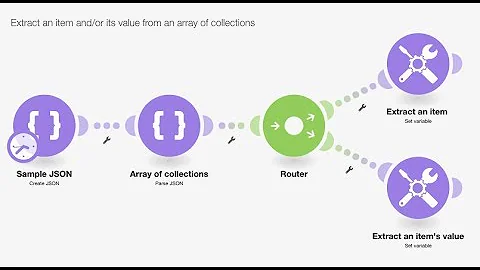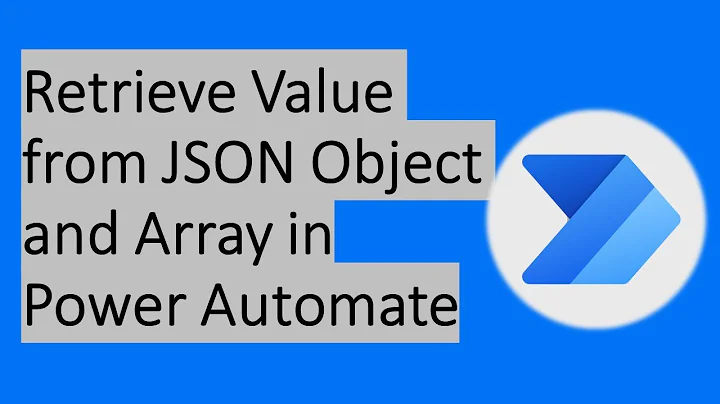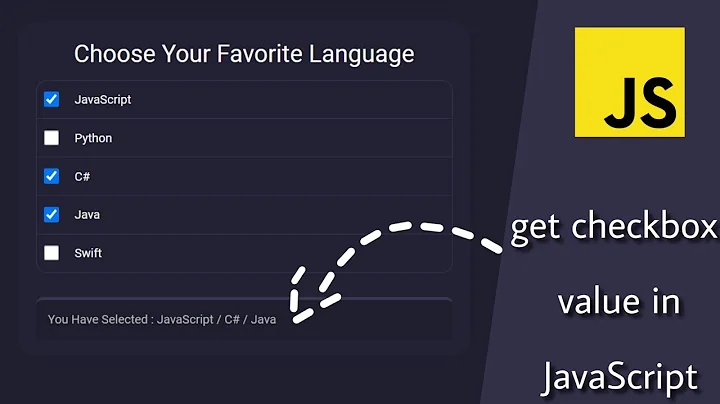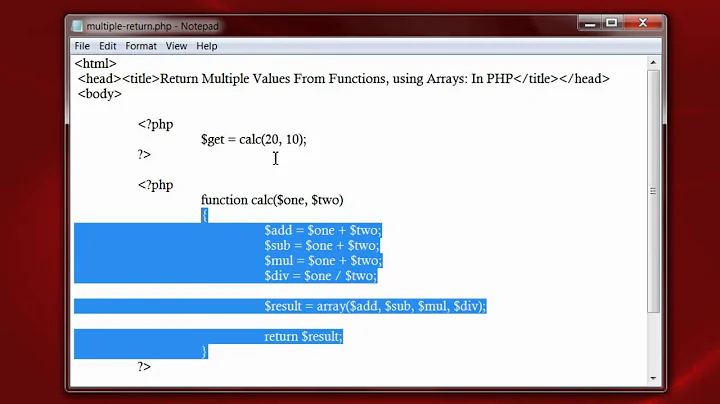Retrieve multiple array values with extract
Solution 1
$arr = array(
array(
'index1'=>'something',
'index2'=>'something else',
'index3'=>'something more',
),
array(
'index1'=>'something',
'index2'=>'something else',
'index3'=>'something more',
),
array(
'index1'=>'something',
'index2'=>'something else',
'index3'=>'something more',
)
);
$output = Set::classicExtract($arr, '{n}.{index[1-2]}');
print_r($output);
// output
Array
(
[0] => Array
(
[index1] => something
[index2] => something else
)
[1] => Array
(
[index1] => something
[index2] => something else
)
[2] => Array
(
[index1] => something
[index2] => something else
)
)
Solution 2
One way (if you only want to keep a few results):
Hash::merge(
Hash::extract($array, '{n}.index1'),
Hash::extract($array, '{n}.index2')
);
Another way (if you only want to remove a few):
Hash::remove($array, '{n}.index3');
Solution 3
Set is AWESOME! You can't do this directly with Set::extract, but you CAN build an associative array of the the two array indexes using Set::combine:
Set::combine($myArray, '{n}.index1', '{n}.index2')
A working example looks like this:
$myArray = array(
array('index1'=>'something 1', 'index2'=>'something else 1', 'index3'=>'something more 1'),
array('index1'=>'something 2', 'index2'=>'something else 2', 'index3'=>'something more 2'),
array('index1'=>'something 3', 'index2'=>'something else 3', 'index3'=>'something more 3'),
);
debug(Set::combine($myArray, '{n}.index1', '{n}.index2'));
This will take an array like you mentioned:
array(
[0]=>
[index1]=>something 1
[index2]=>something else 1
[index3]=>something more 1
[1]=>
[index1]=>something 2
[index2]=>something else 2
[index3]=>something more 2
[2]=>
[index1]=>something 3
[index2]=>something else 3
[index3]=>something more 3
)
and turn it into this:
Array (
[something1] => something else 1
[something2] => something else 2
[something3] => something else 3
)
Solution 4
Have you tried Set::extract($array, '{n}.{s}'); ?
EDIT: If your array dimension is exactly like the one in your answer, you could try array_keys(Set::extract($array, '{n}.{s}'));
Solution 5
I am not sure why you want to stick with the Set class ? If it doesn't suit your need, why would you absolutely use it and not create your own function ?
You say in one of your comments that you want to avoid foreach loops. But the Set class methods are full of foreach loops themselve. I may miss the point...
Personnaly I would do it simply with a function like this one:
function filter_fields($array_to_filter, $fields_to_keep)
{
foreach($array_to_filter as $i => $sub_array)
{
foreach($sub_array as $field => $value)
{
if(!in_array($field, $fields_to_keep))
{
unset($array_to_filter[$i][$field]);
}
}
}
return $array_to_filter;
}
Here is an example of what it would return:
print_r($array_to_filter);
/*
Array
(
[0] => Array
(
[index1] => abc
[index2] => def
[index3] => ghi
)
[1] => Array
(
[index1] => jkl
[index2] => mno
[index3] => poq
)
)
*/
$filtered_array = filter_fields($array_to_filter, array('index1', 'index3'));
print_r($filtered_array);
/*
Array
(
[0] => Array
(
[index1] => abc
[index3] => ghi
)
[1] => Array
(
[index1] => jkl
[index3] => poq
)
)
*/
Related videos on Youtube
Tim Joyce
I am a developer for php, html, css, javascript, jquery, and a few others. These are just the fun ones for me.
Updated on September 16, 2022Comments
-
 Tim Joyce over 1 year
Tim Joyce over 1 yeararray( [0]=> [index1]=>something [index2]=>something else [index3]=>something more [1]=> [index1]=>something [index2]=>something else [index3]=>something more [2]=> [index1]=>something [index2]=>something else [index3]=>something more )EDIT: So I would like to retrieve the following:
array( [0]=> [index1]=>something [index2]=>something else [1]=> [index1]=>something [index2]=>something else [2]=> [index1]=>something [index2]=>something else )How do I get multiple indexes of the array using the Set::extract function in cakephp?
This retrieves one value:
Set::extract($array, '{n}.index1');but I would like to get multiple values ... say, index1 and index2.
I tried statements like the following, to no avail.
Set::extract($array, '[{n}.index1, {n}.index2']);EDIT
$__pages = Hash::merge( Hash::extract($pages, 'pages.{n}.id'), Hash::extract($pages, 'pages.{n}.title') ); pr($__pages);Output:
Array ( [0] => 2 [1] => 4 [2] => 104 [3] => Sample Page [4] => about us [5] => Services )That doesn't really help me since I still need the association like so:
Array( [2] => Sample Page [4] => About us [104] => Services )I would even be happy with :
Array( Array(id => 2, title => Sample Page) Array(id => 4, title => About Us) Array(id => 104, title => Services) )ANSWER thecodeparadox's answer works for the test code that I provided. Here is the real life code in case someone stumbles here. In the book it states, "any string literal enclosed in brackets besides {n} and {s}) is interpreted as a regular expression." This line seemed to be hidden and not very blatant. So knowing this, I simply used regex rules to retrieve the data I needed. I have an array that pulled wordpress posts from an api, I needed to narrow down the results to
id, title.array( posts=> 0=> id => 3 slug => sample-page type => page title => Sample Page //...and so on 1=> id => 7 slug => sample-page-2 type => page title => Sample Page 2 //...and so onTo retrieve just the id and title I added the following line.
pr(Set::classicExtract($pages, 'pages.{n}.{(id|title)}'));this gave me:
array( posts=> 0=> id => 3 title => Sample Page 1=> id => 7 title => Sample Page 2DOCUMENTATION: Book
-
 Tim Joyce over 11 yearsThis will return all strings in the array.
Tim Joyce over 11 yearsThis will return all strings in the array. -
 Tim Joyce over 11 yearsI see what you are saying. I should reword the question, I need the values to come along with the keys.
Tim Joyce over 11 yearsI see what you are saying. I should reword the question, I need the values to come along with the keys. -
Marius over 11 yearsI think I'm missing something here... Assuming you have this array: $array = array(array('index1'=>'something', 'index2'=>'something else', 'index3'=>'something more'), array('index1'=>'something', 'index2'=>'something else', 'index3'=>'something more')); then accesing the keys and values from the subarray is as easy as getting $array[index], no?
-
 Tim Joyce over 11 yearsI simplified the array. The array could have potentially hundreds of nested arrays with the same keys. Trying to avoid a foreach loop.
Tim Joyce over 11 yearsI simplified the array. The array could have potentially hundreds of nested arrays with the same keys. Trying to avoid a foreach loop. -
Marius over 11 yearsI understand, but the question is: the keys from the second level array can repeat? like in my example above, where you have index1, index2 and index 3 in the second subarray, too? In this case what exactly do you want to get in the result? You should put an initial array with 2 or 3 subarrays and then an example array to specify the format of the array you want to get as a result
-
dogmatic69 over 11 years@TimJoyce you can not 'avoid a foreach', that is what Hash::* uses. Somewhere there will be a loop.
-
 Tim Joyce over 11 yearsI like your first approach here, and I think it's close. I updated my question to provide you with the output I got when doing that. The formatting is just a bit off because I still need the id and title to be an association. Thanks
Tim Joyce over 11 yearsI like your first approach here, and I think it's close. I updated my question to provide you with the output I got when doing that. The formatting is just a bit off because I still need the id and title to be an association. Thanks -
 Tim Joyce over 11 yearsThank you for your answer. When I said I wanted to avoid a foreach loop, it's because I already know how to do it that way. I was looking for a more "Cake" way of doing this. I feel the new cakephp documentation for 2.x is lacking in many ways and hoping someone has the answer. Since my migration to 2.x I have google searched most of my problems because of the lack of documentation. The api is great but the cookbook is not.
Tim Joyce over 11 yearsThank you for your answer. When I said I wanted to avoid a foreach loop, it's because I already know how to do it that way. I was looking for a more "Cake" way of doing this. I feel the new cakephp documentation for 2.x is lacking in many ways and hoping someone has the answer. Since my migration to 2.x I have google searched most of my problems because of the lack of documentation. The api is great but the cookbook is not. -
nIcO over 11 yearsI believe you that you know how to do it yourself :-) But if the Cake libraries can't, that is yet another reason to create your own function.
-
dogmatic69 over 11 yearsThis can all be done in a single line, $filtered = Hash::remove($array, '{n}.index3');
-
nIcO over 11 yearsIf we want to discard only one field, that's true. But with many more fields Hash::remove() would have to be called many times, which would be less performent.
-
thecodeparadox over 11 years@Tim Joyce Please test my answer.. and I hope you'll get your desired answer. Thanks.
-
 Tim Joyce over 11 yearsThanks for this. You answered my question and led me on the right path to research why this worked and I was able to adapt it to my real life code. I am updating my question with my findings.
Tim Joyce over 11 yearsThanks for this. You answered my question and led me on the right path to research why this worked and I was able to adapt it to my real life code. I am updating my question with my findings. -
mmv_sat about 8 yearsLooks like the set class is depreciated in favor of the Hash class









